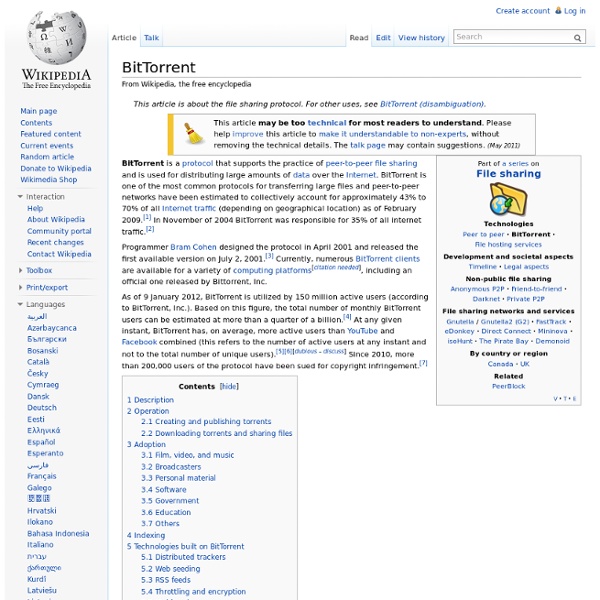BitTorrent

Chmura obliczeniowa
Diagram przedstawiający „chmurę” Zasada działania chmury obliczeniowej[edytuj | edytuj kod] Zasada działania polega na przeniesieniu całego ciężaru świadczenia usług IT (danych, oprogramowania lub mocy obliczeniowej) na serwer i umożliwienie stałego dostępu poprzez komputery klienckie. Dzięki temu ich bezpieczeństwo nie zależy od tego, co stanie się z komputerem klienckim, a szybkość procesów wynika z mocy obliczeniowej serwera. Wystarczy zalogować się z jakiegokolwiek komputera z dostępem do Internetu by zacząć korzystać z dobrodziejstw chmury obliczeniowej. Pojęcie chmury nie jest jednoznaczne, w szerokim znaczeniu przetwarzanym w chmurze jest wszystko przetwarzane na zewnątrz zapory sieciowej, włączając w to konwencjonalny outsourcing[2]. Rodzaje chmur[edytuj | edytuj kod] Rozróżniamy chmury: Modele chmury obliczeniowej[edytuj | edytuj kod] Współcześnie coraz więcej nowych funkcjonalności umieszczanych jest w modelu chmur obliczeniowych. Kolokacja[edytuj | edytuj kod] Osobny artykuł: IPaaS.
Computación en la nube
Computación en la nube, o «la nube» La computación en la nube (del inglés cloud computing),[1] conocida también como servicios en la nube, informática en la nube, nube de cómputo o simplemente «la nube», es un paradigma que permite ofrecer servicios de computación a través de una red, que usualmente es internet. Introducción[editar] La computación en la nube es la disponibilidad a pedido de los recursos del sistema informático, especialmente el almacenamiento de datos y la capacidad de cómputo, sin una gestión activa directa por parte del usuario. A menudo, el término «computación en la nube» se lo relaciona con una reducción de costos, disminución de vulnerabilidades y garantía de disponibilidad. La computación en la nube es un nuevo modelo de prestación de servicios tecnológicos que impacta sin lugar a dudas en diversos negocios. Comienzos[editar] Fundamentos[editar] Desde los años sesenta, la computación en nube se ha desarrollado a lo largo de una serie de líneas. Tipos de PaaS[editar]
Modelos de Despliegue de CloudComputing (taxonomía del NIST) » Realcloud Project
En el comentario del 20-feb-2011 veíamos la definición que el NIST realiza para el concepto de CloudComputing, y al día siguiente (el 21-feb-2011) analizábamos los 3 “Modelos (o niveles) de Servicio” (SaaS, Paas, e IaaS) tal como los define el NIST (pues ambas, definición y clasificación, son la más aceptadas en la actualidad). También el NIST distingue entre 4 “Modelos de Despliegue” (Privado, Comunitario, Público e Híbrido) que introduce una ligera diferencia (el modelo comunitario) sobre el resto de la bibliografía actual al respecto (y que, en mi opinión, es importante considerar en un país como España, donde el cooperativismo tiene buenas raíces): Nube Pública: La infraestructura de la nube está disponible al público en general (o un subconjunto en función de los criterios de venta del Proveedor). La infraestructura pertenece a la organización que vende sus servicios de Cloud Computing.
Related:
Related:



